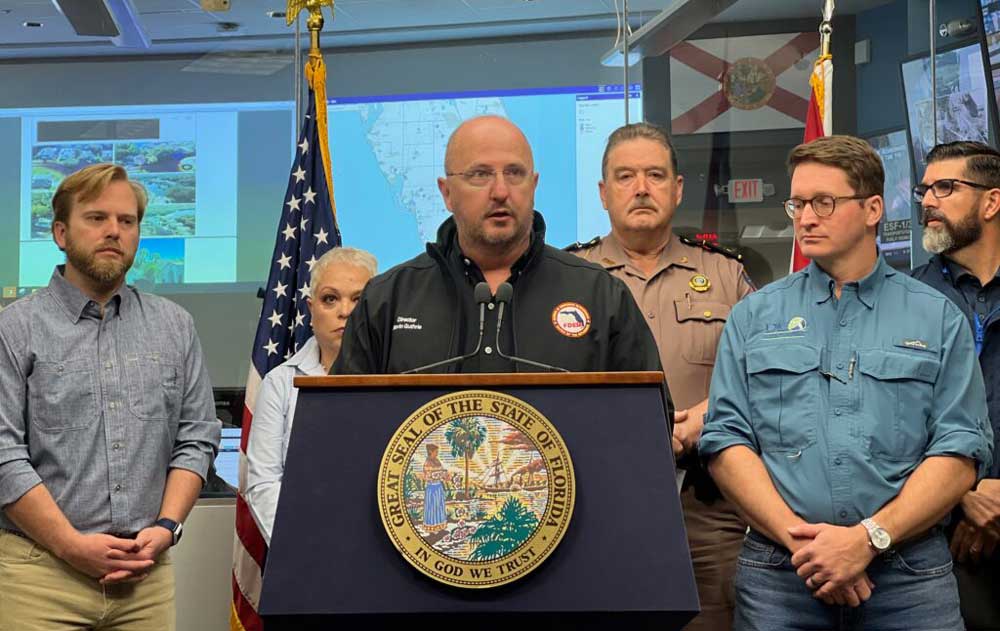
State emergency responders are beginning the daunting task of finding temporary housing for people displaced by Hurricane Ian, Florida Emergency Management Director Kevin Guthrie said Monday.
The first thing, he said, is to move people out of temporary shelters in places like schools and into central locations, to free space for classes to resume. The state is also considering establishing regional shelters, Guthrie added.
Next comes temporary housing, which the Federal Emergency Management Agency will take the lead on. However, Guthrie said, he has spoken with his counterpart in Louisiana, who has promised to send 500 FEMA trailers left over from earlier disasters.
“We should be able to get that mission moving; we will stage those trailers somewhere,” he said.
Other displaced people will be housed in hotels, but that effort is going slowly because so many hotels remain without water, especially in Lee County, Guthrie said.
We’ve asked the Division of Emergency Management for an estimate of the number of people displaced but haven’t heard back yet. We’ve also asked FEMA about its plans for housing; again, we haven’t received a response yet.
Guthrie spoke during a morning news conference at the state Emergency Operations Center in Tallahassee, flanked by representatives of eight agencies helping with the recovery effort.
Lack of water
One big problem is lack of water caused by the rupture of a water main in Lee County.
The state signed a contract Sunday with an engineering company with a mandate to restore water to 50 percent of the buildings capable of receiving it within 72 hours, with 75 percent restored within five days and 100 percent by Sunday, he said.
“Which happens to be the same day that electrical individuals said that they will have most of the restoration done to homes that can receive that,” Guthrie said.
He did not identify the company but said: “That vendor is on site right now, turning wrenches, cutting pipe, getting stuff fixed.”
We’ve asked Guthrie’s agency for details about that, too.
 Line workers have restored electricity to more than 2 million customers, although nearly 621,000 remain without, Guthrie said. He estimated that power would be restored to customers able to receive it — meaning those with lines connected to habitable homes — by Sunday.
Line workers have restored electricity to more than 2 million customers, although nearly 621,000 remain without, Guthrie said. He estimated that power would be restored to customers able to receive it — meaning those with lines connected to habitable homes — by Sunday.
“This does not include those areas catastrophically hit where there is absolutely no infrastructure, no homes and so on,” Guthrie said.
Additionally, the state has established eight fuel depots to supply the response teams, with more than 1.5 million gallons on hand, and distributed 829,000 meals and 3.8 million bottles of water through 34 distribution points in Southwest Florida.
Safety
Guthrie made two pleas in the interest of safety:
“Do not disaster sight-see. Anybody that is just coming into an area to see the damage needs to leave the area so the first responders can do their job,” he said.
“Do not fly drones where responders are at. Helicopters will have to cease operations until we identify where the drone is operated from and take that drone out of service,” he added.
The Florida National Guard has deployed 5,200 troops to the area, many of them now concentrating on providing security on the damaged barrier islands, Lt. Col. Blake Heidelberg said, and on flooded inland areas.
The state set up websites where people could report that they were sheltering in place. It got 20,660 reports, each representing one household, said Jamie Grant, Florida’s chief information officer. By the morning after the storm, 10,416 households reported that they were safe, Grant said. The state received 901 requests for rescue.
The state also has portals to report people as missing or safe, he said.
Members of 17 search and rescue teams are checking every address given and will take a second look at every location, Guthrie said.
“I’m not saying we’re not going to find anybody else … . We may find other people. But here’s the thing: We believe that we have searched everything very quickly; now we’re going back and doing that technical search by address,” he said.
Mobile internet cafes
Mobile internet cafes have been set up where people can access cellphone networks and recharge their devices. They are capable of serving 120 devices at one time, Grant said.
The Florida Highway Patrol has dispatched its FLOW mobile — for Florida licensing on wheels vehicle — to Fort Myers to help people replace lost drivers’ licensing and car tags. It’ll be open between 8 a.m. and 6 p.m. seven days per week, said Col. Gene Spaulding, director of the Florida Highway Patrol.
A big problem the patrol is seeing is that some roads are still flooded, he said.
“Keep in mind that just because the water recedes, that doesn’t mean the road is necessarily safe to travel on. There is a high likelihood of washouts under the asphalt under the roadway, so please don’t drive around barricades,” Spaulding said.
“If you don’t need to be on the roadways, don’t be on the roadways. Leave it available for first responders to be able to respond.”
–Michael Moline, Florida Phoenix





























Jon Hardison says
What’s with all this socialism?
Only the strong survive!
Thoughts and prayers.
(Sounds pretty ridiculous now, doesn’t it?)